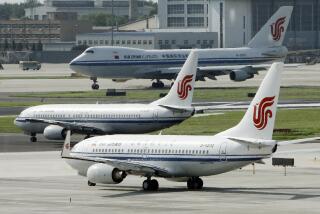U.S. Agency Awards UPS 6 New Flights to China
- Share via
United Parcel Service Inc., getting a major boost from U.S. regulators, on Tuesday joined the roster of carriers entitled to make flights to China, one of the world’s fastest-growing markets for freight and passenger traffic.
UPS, beating out several rivals in a closely watched competition, won six of 10 new weekly flights awarded by the Transportation Department. The government’s decision to award most of the new China flights to UPS signals a shift at DOT acknowledging the economic value of the air cargo industry. UPS’ victory also could mean more jobs in Southern California.
The other four flights went to carriers already serving China: two to UAL Corp.’s United Airlines, and one each to Northwest Airlines Corp. and UPS rival FedEx Corp.
“It’s a major coup for UPS,” said Bob Agnew, president of Morten Beyer & Agnew, a Virginia-based consulting firm. “Freight and passenger growth in China just about exceed the rest of the world together as far as a percentage of [the total] growth rate.”
The routes are the first expansion of service between the United States and China since 1995. The carriers will be able to begin flying the new routes in April. UPS was chosen over AMR Corp.’s American Airlines, Delta Air Lines Inc. and closely held Polar Air Cargo Inc., based in Long Beach.
Atlanta-based UPS and the six other carriers bid for the routes after a U.S.-China agreement in April 1999 liberalized airline access to the countries. The DOT decision will become final after a 30-day comment period.
“The DOT made a bold, forward-looking decision that recognizes the new economy and UPS’ role in the global marketplace,” UPS Chairman James Kelly said in a statement.
Four of UPS’ six flights will originate from UPS’ air hub in Ontario, then proceed to Anchorage, Beijing and Shanghai. The other two will leave from Newark, N.J., and stop in Anchorage, Shanghai and Tokyo.
UPS has said its ability to fly to China not only will lower costs for U.S.-China express shipments but also will create as many as 1,200 U.S. jobs at the company. About 3,500 full- and part-time employees currently work at its Ontario site.
Industry officials and analysts said DOT’s decision to grant the majority of the routes to UPS was also an acknowledgment of the economic potential of air cargo service.
“We have pretty good passenger service in the region,” said Transportation Secretary Rodney Slater. “Now we have a great potential for enhanced cargo opportunities.”
UPS earlier said its sales in China would more than triple, topping $300 million a year, by mid-2002 if it won all 10 routes. Airline passenger and cargo volume has more than tripled in the last five years in China, according to DOT.
U.S. air freight trade with Asia last year totaled $6.3 billion, more than half of the total $11.3 billion in international air cargo shipments. FedEx has been serving China since 1984 and began direct flights in 1995.
China “is by all accounts the market with the greatest potential and probably the most significant impact on global trade,” said Greg Rossiter, spokesman for Memphis, Tenn.-based FedEx. “We’ve built a substantial advantage for our customers in Asia, and we intend to continue to maintain that.”
Northwest, which had applied for five new flights, said it isn’t certain whether it will use the single new route for cargo or passenger service. The carrier has been rejecting freight destined for Shanghai because of a lack of airplane space, said Northwest spokesman Doug Killian.
Chicago-based United, the world’s largest airline, will use the two new flights to make its current five-times-a-week passenger service between San Francisco and Shanghai a daily flight.
After the announcement, UPS’ stock gained $1 to close at $60.31. UAL rose 44 cents to $37.50, Northwest jumped $1.75 to $29 and FedEx gained $2.90 to $49.40. Even the losers’ stocks did well, as AMR gained $1.44 to $36 and Delta rose $1.56 to $49.75 a share.
More to Read
Inside the business of entertainment
The Wide Shot brings you news, analysis and insights on everything from streaming wars to production — and what it all means for the future.
You may occasionally receive promotional content from the Los Angeles Times.










